CHICOPEE, Mass. (WWLP) – Single-digit temperatures sweeping through western Massachusetts Sunday morning, accompanied by severe wind chills, can pose a health risk.
The CDC is reminding the public to be careful about winter-related illnesses. Prolonged exposure to this type of cold eventually depletes the body's energy stores, resulting in hypothermia, or hypothermia.
Warning signs of hypothermia
adult:
- Trembling, feeling tired
- confusion, fumbling
- Memory loss, slurred speech
- sleepiness
infant:
- red and cold skin
- very low energy
what will you do
If you notice any of these signs and your or someone else's temperature is below 95 degrees, seek medical attention immediately. If medical care is not available, the CDC recommends starting the person warm by:
- Take the victim to a warm room or shelter.
- If the victim is wearing wet clothing, remove it.
- If possible, use an electric blanket to warm your core, chest, neck, head, and groin area first. Alternatively, use layers of blankets, clothing, towels, sheets, etc. for dry skin-to-skin contact.
- Hot drinks can help raise body temperature, but don't give alcoholic drinks. Do not try to give anything to drink to an unconscious person.
- Once the body temperature rises, keep the body dry and wrap it with a warm blanket, including the head and neck.
- Seek medical attention as soon as possible.
If the body temperature is too low, it affects the brain and the affected person is unable to think clearly or move properly.
Frostbite is also associated with prolonged exposure to cold and can cause permanent damage to affected areas of the body, most commonly the nose, ears, cheeks, jaw, fingers, and toes.
Frostbite warning signs
- white or grayish-yellow skin areas
- Skin becomes unusually hard or waxy
- Numbness
what will you do
If you have these symptoms of frostbite, seek medical attention. If you have frostbite but no signs of hypothermia and cannot seek immediate treatment, follow these steps:
- Get into a warm room as soon as possible.
- Do not walk on frostbitten feet or toes unless necessary. Damage from frostbite will increase.
- Soak the affected area in lukewarm rather than boiling water (the temperature should be comfortable for the rest of the body to touch).
- Or use your body heat to warm the affected area.
- Do not rub or massage the frostbitten area with snow. This may cause further damage.
- Do not use heating pads, heat lamps, or heat from stoves, fireplaces, or radiators to heat up. The affected area will feel numb and may burn easily.
heart health
Cold weather also puts extra strain on your heart. If you have heart disease or high blood pressure, follow your doctor's advice about shoveling snow or doing other hard work in cold weather. If you have to do heavy outdoor work, wear layers of warm clothing and work slowly.
Infants under 1 year old should not sleep in a cold room because they lose body heat more easily than adults and cannot generate enough body heat through shivering. If your home is cold, provide your toddler with warm clothing and try to maintain the temperature inside.
If you have someone over the age of 65, make sure their home is properly heated, as older people over the age of 65 often have slower metabolisms and less physical activity, so their bodies produce less heat. Please make sure you are there.
Eating a balanced diet also helps keep your body warm. Do not drink alcoholic or caffeinated drinks, as they cause your body to lose heat quickly. Drink warm, sweet drinks and soups to maintain body temperature. If you have dietary restrictions, ask your doctor what they recommend.
22News began broadcasting in March 1953, providing local news, network, syndicated, and local programming to Western Massachusetts. Follow news on WWLP-22X @WWLP22 News And Facebook.


